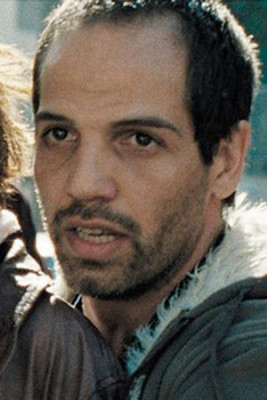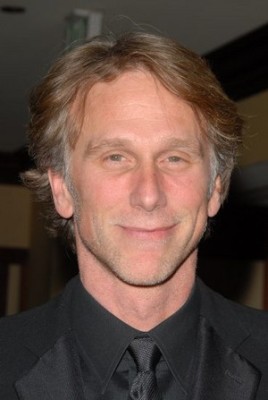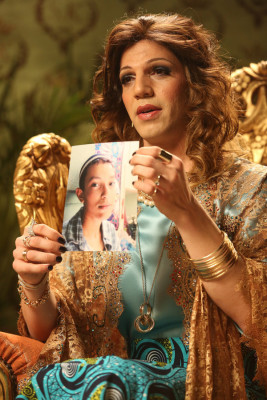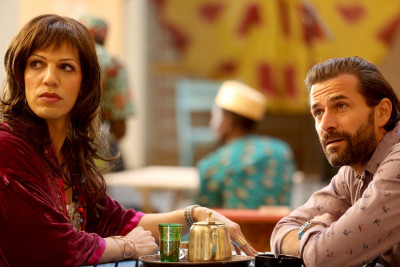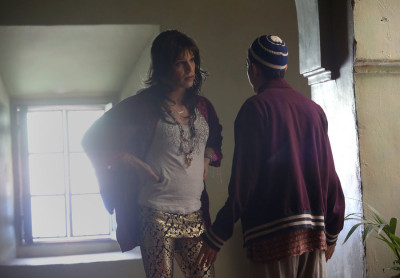American Odyssey (NBC, Sundays, 10/9C) has been compared (positively and negatively) to Homeland. It’s a complex show with threads that link three different locales and sets of related characters to a conspiracy within the military-industrial complex – all tied together through a female Special Forces solider named Sgt. Odelle Ballard.
In last week’s episode, one of the few people she had come to trust to help her get home, Shakir Khan (Yousef Sweid), was killed. Shakir was unique and her death carried with it a unique impact. A few days ago, Sweid and series executive producer Peter Berg spoke about Shakir’s death, conspiracy theories and more with a group of bolggers/journalists.
Hello, gentlemen. I am so fascinated with the complexity of each of the characters and how their story unfolds, pulling threads and unraveling the bigger story of secrets and conspiracies. My question for Peter is do you think you were crossing the line by showing the US military as the bad guy as part of this?
Peter Horton: You know, our intention from the beginning of this project was never to frankly pin any one group as bad or good. There certainly are individuals who have their point of view that creates all sorts of trouble. But even as you – I think as you see the series go on even someone like Colonel Glen in Episode 13 has a really long speech about his point of view.
And what we’ve always tried to do is give each character a point of view. And so even though they may be doing things that seem rather bad at the time, they’ve got a reason for it. And we also never intend, as the series goes on you’ll see as well that the whole American military is bad. The idea is that there’s a seam within the military industrial complex that sort of join hands over the years – over the last couple of decades with private industry so that there’s a grey zone in between those two.
It’s Dick Cheney being the head of Haliburton and then becoming the Vice President and us going to war.
That’s right.
Horton: You know it’s a seam within that’s got an agenda. That has – it has a theology that they’re implementing. And from their point of view for good, for the good. So that’s always our intention. It never was to really say by any means that the whole American military is bad at all.
Oh, no. I’m from a third generation military family. So I’m not offended at all by anything that you’re doing. It’s just interesting.
Horton: That’s good to hear.
And my final question – oh, sorry. Go ahead.
Horton: No. No. No. That’s fine. I just was going to repeat myself and I probably shouldn’t do that.
And I have a question for Yousef. You played your character to perfection especially considering the circumstances. Why was it important for you to take this role and play this character?
Yousef Sweid: Oh, thank you.
First of all, like Shakir had to be famous. And second is well you know as an actor, I think I remember the first time I went to do makeup and hair. And another actor came inside and he said, “Wow, it’s like the dream of every male actor to play a woman.” And I think it’s one of the biggest dreams. It’s kind of – it’s a lot of freedom inside.
I love all the fun. I love – and the character itself, it’s very – she’s a very complex and has a very interesting story. So, and very deep. So of course, in every kind of aspect, it was one of the most interesting parts I ever read. So I was really, really – really, really wanted to do it. So, yes.
Horton: I’ll add a little bit to that which is that it was – we really searched far and wide to find the right actor for this part. It’s a very difficult narrow path to walk playing this role because it’s – as Yousef said, it’s not only complex. It’s very, very delicate. There’s just the right calm for this character to be genuine and honest and true, but at the same time have a flair and have a presentation and a show.
And you know we finally found Yousef who really auditioned for us a number of times remotely. And just every time kept nailing that narrow path between overdoing the show or over emphasizing the earnestness of it. And you know that’s why – that’s the big reason why you have a character in front of you that you’re responding to is we just found the right guy for it.
Yousef – Yousef, American TV doesn’t have a lot of drag queen characters, regular characters at least and – we don’t have as many Arab characters as we should. Do you feel any special responsibility playing both?
Sweid: Yes. Of course. But not just because it’s American TV. I feel responsibility as an Arab doing these kind of characters which are very dangerous. I know there are a lot of transgenders and drag queens which are Arabs and which their – they live in danger. Like they can live their lives maybe more if it’s more in the western world.
But also there, it’s dangerous for them. And in my life as an actor in my work, I always wish to do these kind of characters they have also kind of a message. And not only for the American, but also for me or for the Arab world. Or you know I guess there’s a lot of Arabs in the US. So for me, it’s for myself also to do this kind of message for – you know for other people.
And this character is living – what kept me going or what I think one of the features of this character is that she’s always in danger. She’s having fun. She’s happy. But she’s always in danger that something bad will happen to her. Like at any moment, can go out with a gun and kill her. And I think to see this world is special and different and interesting.
Thank you. And Peter, do you know when you’ll find out if we get a second season or not?
Horton: Boy, I’ll tell you. I’m sitting on pins and needles. You know obviously hoping against hope that indeed we’ll get that. You know, they – everyone at NBC really loves the show and really, really wants it to go. We just need some more people to watch it.
And I think we’re all hoping that over the next few weeks, we’ll get a bit of an uptick and give everyone a reason to say – to say, “Yes”. But we’ve pitched a second season to them. And everyone is you know just really onboard with that. So it’s just a matter of again what’ll unfold over the next couple of weeks.
Peter, I’m wondering can you tell us about what’s coming up in the next few episodes without being super spoilery which I’m sure you’re not even allowed to do.
Horton: It’s really great stuff.
Sweid: Everybody must die.
Horton: Yes. Yes. There’s a few more people dying. You know it’s – the main thing to know is that each season of this show is going to have a beginning, middle and end. So there is – it isn’t one of those things where you know you’ll be left not understanding things and having to wait until next season to understand them. They’ll be a sense of completion this year.
But you know the journey just starts getting more and more poignant really I think you know as the stakes build towards a climax and towards a conclusion. The story becomes a little more poignant and I think a little more emotional and meaningful as we go. So it’s going – it still has the – you know the feel of our show has always been tension.
But I think the mixture starts leaning a little bit more towards emotion as we go.
Yousef, I have to say, I really enjoyed your story line so much. And I was a little bit devastated after last week’s episode.
Horton: Sorry.
Well, no. Can you…
Sweid: What happened? I don’t know. What happened?
Can you talk about maybe your favorite scene? Or I don’t know just you know a great experience from working on this show?
Sweid: Wow. Let me think.
Horton: I’ve got to say one of the things I so love that just happened on the show between the two of them is, Yousef is your relationship with Diallo. You know I just – if that helps…
Sweid: Ah, yes.
Horton: Sort of spark a thought. I mean you guys really had this beautiful chemistry to each – with each other. It really was the two actors, both of them.
Sweid: Yes. I – actually it was one scene. Actually, we did it twice. I mean we shot it two days. Like we did once and after, we did it again. And then I got more into character. But there’s – it’s amazing this relationship because they’re really, really in love. And you feel the danger because Diallo doesn’t want to say anything about his relationship of course.
And how she manipulates him but still loves him is one of the best like things I’ve felt in this kind of thing. Like, there could be manipulation, but that doesn’t mean that there’s no love. And because the situation is very so difficult and delicate, it has to be there, the kind of using each other but with love.
And each one knows the other’s points, where to push. And I love it that each one – like, she wants to be very famous and loved. And he wants to be a general. And they use each other with love to get there. And I think they – both of the characters bring a lot of fun to the show. And at the same time, you know drama and sadness. But both colors, I mean.
So I remember one scene when she tries to convince him to save Odelle. And he doesn’t want to. But then you see the love between them. And she kind of manipulates to say, “Oh, if you save her, you’re going to be a famous man in the world. And you’re going to be a great famous person.” She knows where to touch him.
And I remember the scene because it was very kind of a – how do you say? – complex. And at the same time, Omar is on the side.
Horton: That was one of our early episodes.
Sweid: Looking at them I think.
Horton: Yes. It’s an – I think that’s an episode. Gosh was that 4, Episode 4, something like that with Aslam sitting there. And the two of you – you trying to convince the general to… finally to help. It was either Episode 3 or 4 if that’s helpful.
Peter, we’ve seen Aslam’s immediate reaction to the death of Shakir. But how did this particular death effect Aslam in the long run, in moving forward?
Horton: Oh, you know it’s so – it’s such an interesting journey for him because – because you know the degree to which he is in need of family. You know his family gets pretty well wiped out in the pilot. The only family he has is his – this uncle he’s never really met who he just goes to because it’s his only option.
And then to discover his uncle is a cross dresser which at first is offensive to him. But then as you see, falls in love with him. Just gets so connected to him. And then when his uncle’s dead, the only family he has left, as a possibility is Odelle. Yet he’s trying to get Odelle home. And – which means out of Africa and into the United States.
So there’s a great sort of conflict for them both as to how – what are we going to do with Aslam? Does he go home with her? Does he stay in Africa? Does she stay in Africa? I mean it’s a – it’s a kind of very rich and emotional dilemma for them both as they kind of form their own sense of bond and family.
And then my next question is for both of you. Has working on the series changed your attitude towards conspiracy theories at all?
Sweid: For me, no. I don’t think so. I never really went to deep inside of these theories because it’s sometimes too complex. And it’s not for me. I want to be a, you know, a simple human being who works and loves his work. And I just – you know sometimes it’s fun to get into these kind of things. But I don’t go to deep. Anyway, so it didn’t actually change.
Horton: I think for me, it’s – you know all of this conspiracy theory was born out of you know the headlines, out of what’s going on in life right now. Obviously, we’ve taken it to an extreme, but not very far. We didn’t have to travel far to get to a conspiracy theory. You know, the sort of market value being the primary value in the world even over the value of human life is prevalent is real.
Like I said a little bit before, the collusion between or the sort of grey zone, the relationship now between representative government and industry is braided together in a way that I don’t think it ever has been before. You know, so you start asking the question the series basically fundamentally asks is do we and the representative government still have power to stand what we believe is right?
And so the conspiracies that evolve around that really do come from – in a way it’s a cautionary tale like because it comes from what’s actually going on. So in that sense, I suppose it has. I don’t consider myself a conspiracy theorist. I don’t. I think a lot of conspiracy theory is based on sort of knee jerk paranoia.
And I don’t consider myself a paranoid individual. But I do find myself concerned with what I see going on in those areas. So it’s – to the degree that it’s made me lend some credibility to conspiracy theories, then I guess in that sense.
Yousef, I work on the social media for the show. And we did a special shout out for fan questions. And this comes from Sara Beth Rossfield: What an incredible performance. You are on my radar now. And I want to see everything you’ve done. What special things, if any, did you do to prepare for this role?
Sweid: Well, actually audition. I think I did a couple of auditions. And each one, you know, a bit more. And I was living in Tel Aviv for 20 years. And now I live in Berlin. And its huge cities and very welcome cities for you know drags and transgenders and for sexuality and everything. So I have a lot of friends who just you know being around them, going to parties.
Just watching one of the auditions I did, one of my friends who works as a drag dressed me up and you know we had a lot of fun. And you know I didn’t have to imitate anything. But you know you go, you see. You collect things as you like. You mix it up with your personality. It was the love of trying to be a woman.
I think every man would love to try it once in a while. Every many has kind of a fantasy. And you get in touch with this fantasy. And in the end, it’s you know all of these things. And of course, reading takes an understanding what’s going on and what the – the character and the production and Peter told me where the character comes from.
And so basically, research.
Great. And I have a follow-up question for you. This comes from Meg Miller from Twitter. And she says, “What is the most challenging part about playing your character?”
Sweid: Challenging part. I think one of the challenges is sometimes you wish for these kind of characters to have a long time. Like, if you work on this character half a year because the challenge is to forget that you’re acting with a lot of characters. Forget that you’re acting and just to be concentrated on what you want and what is stopping you.
And that’s it. And not – and I didn’t have so much time. So I was a lot of times busy of his feminine side and how he’s walking or she’s walking and she’s talking. And sometimes I wish and it happened actually that I would forget all that and concentrate on being here and now. And just listening to my partners.
And just being there without trying to be the character and just be there. And I think this is one of the hardest things to do. And I think Peter and all the directors I worked with really helped me to get there. And it was, yes, it was amazing.
Great. Thank you.
Horton: Thanks so much. Appreciate it.
Sweid: Thank you very much.
Photos by Keith Bernstein/Courtesy of NBC
